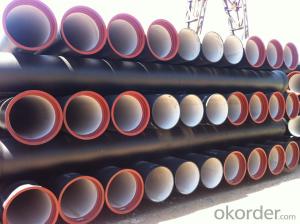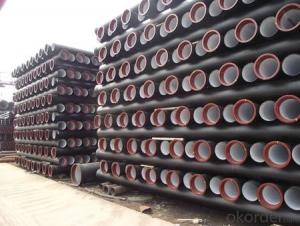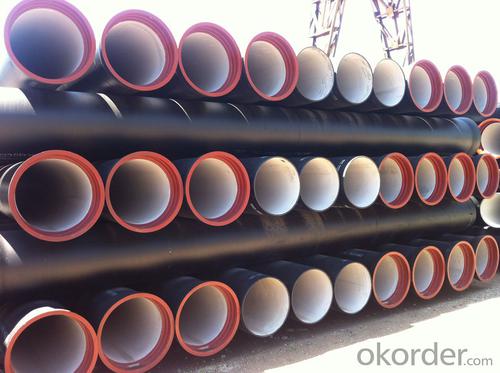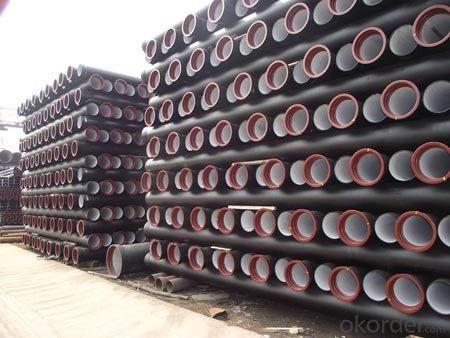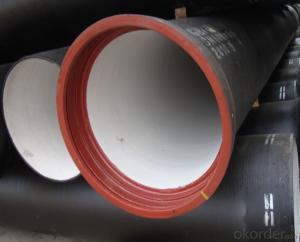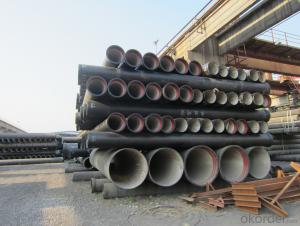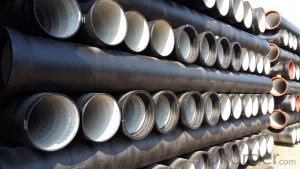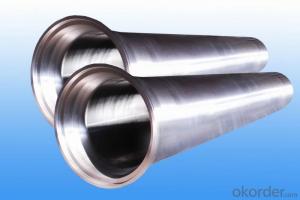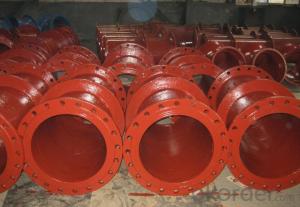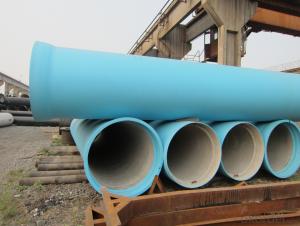Ductile Iron Pipe of China DN100-DN800 EN545 for Water Supply
- Loading Port:
- China main port
- Payment Terms:
- TT or LC
- Min Order Qty:
- 20 m.t.
- Supply Capability:
- 50000 m.t./month
OKorder Service Pledge
OKorder Financial Service
You Might Also Like
1,Ductile Iron Pipe Description :
DI pipe fittings are manufactured according to ISO 2531 or BS EN545 or BS4772 FOR POTABLE WATER ,internal is cement lining or wet epoxy coating;External is zinc plus bitumen or wet epoxy coating. We also manufacture ductile iron fittings with fusion bonded epoxy both inside and outside. All the producets are sutible to water pipes fields.
Pipes confirm to ISO2531,K9 class,T type joint,6m long,with inside cements lining conform to ISO4179, outside Zinc spraying(130g/m2) and bitumen coating(70μm) conform to ISO8179.
Pipe ends: Spigot and socket ends, with 100% SBR rubber gaskets accoding to ISO4633
2,Main Features of the Ductile Iron Pipe:
·High yield strength
·High tensile Strength
·High corrosion resistance
·Pressure Resistence
·Anti-corrosion
·Installation is convenient
·Satisfy the highest hygienic standards
Material: Ductile iron grade 500-7/ 450-10 in accordance with ISO1083
Standard: ISO 2531, EN545, EN598, ANSI, AWWA
Certificate: ISO9001, ISO14001, SGS, NSF, WRAS
Test: In accordance with ISO 2531 / EN 545 / EN598 and 100% water pressure test
Length: 6m or cut into 5.6m, 5.7m, 5.8m
3,Ductile Iron Pipe Images:
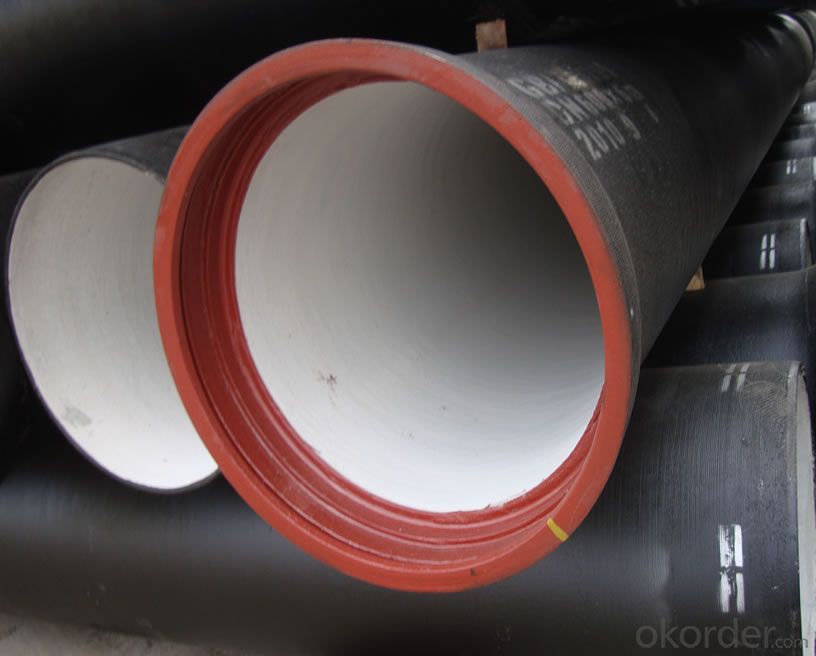
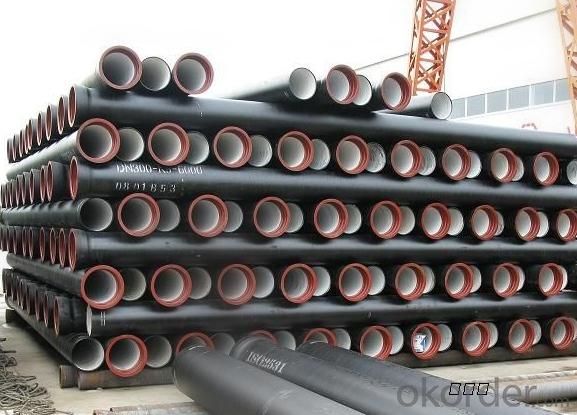
4. Ductile Iron Pipe Specification
Quick Details
Place of Origin: China (Mainland)
Model Number: DN80-1600 Length: 6M/5.7M/NEGOTIATED Standard: ISO2531 / EN545
Application: Potable/Sewage Water
Diameter: DN80-1600
Shape: Round
Hardness: 230 Pipe
Wall Thickness: standerd
Pull Strength: 420
Yield (≥ MPa): 300
Material: Ductile Iron water ductile iron pipe: SO2531 / EN545 DI pipe
Packaging & Delivery
Delivery Detail: 30-45 days
ductile iron pipe:
1. DN80-DN1600mm (T-Type, Class K9)
2.effective length 6m/pc
3.comply with ISO2531/EN545/EN598
5.FAQ:
We have organized several common questions for our clients,may help you sincerely:
1.Q: Why would you choose ductile iron pipe rather than other pipe materials?
A:The reasons are obvious for that not only ductile iron pipe possesses the inherent strength and flexibility of ductile iron, combined with proven corrosion protection systems, but also the cost savings can be achieved from design to installation and commissioning.
2.Q:Why can you guarantee the inner of pipes can’t be corroded?
A: High alumina cement mortar lining and sulphate-resistant cement mortar lining. These two special linings are applicable to inner anti-corrosion for sewage pipes, improving resistance to erosion of the sewage components.
- Q: What is the relationship between the installation direction of the ductile iron pipe and the direction of flow?
- The ductile iron pipe is installed in the direction of the current.
- Q: What are the specifications for the installation of water ball iron pipes?
- Groove support: according to the groove soil, groundwater, slotted cross section, load conditions and other factors, the design requirements are firm and reliable, to prevent landslides, support, shall not impede the lower pipe and stable pipe.
- Q: What is the typical cost of maintenance for ductile iron pipes?
- The typical cost of maintenance for ductile iron pipes can vary depending on several factors. These factors include the age and condition of the pipes, the location and accessibility of the pipes, and the specific maintenance requirements. In general, regular maintenance activities for ductile iron pipes may include cleaning and flushing to remove sediment and debris, inspecting for leaks or cracks, repairing or replacing damaged sections, and applying protective coatings to prevent corrosion. These maintenance tasks are essential to ensure the longevity and performance of the pipes. The cost of maintenance for ductile iron pipes can range from a few hundred dollars to several thousand dollars per year, depending on the extent of maintenance required. Routine maintenance activities such as cleaning and inspection may have lower associated costs, while more significant repairs or replacements can be more expensive. Additionally, the cost of maintenance can be influenced by external factors such as labor costs, materials, and contractor fees. It is crucial to consider these factors and consult with professionals or utility companies for accurate cost estimates specific to your location and situation. Overall, while the cost of maintenance for ductile iron pipes can vary, investing in regular maintenance is essential to extend the lifespan and functionality of the pipes, minimize disruptions, and prevent costly repairs or replacements in the long run.
- Q: Are ductile iron pipes suitable for installation in rocky or hard soil conditions?
- Yes, ductile iron pipes are suitable for installation in rocky or hard soil conditions. Ductile iron has excellent strength and durability, making it highly resistant to external pressures and impacts. It can withstand the challenges posed by rocky or hard soils, ensuring reliable and long-lasting performance.
- Q: How to distinguish flexible and rigid interfaces between cast iron pipe joints
- Flexible connections can be kept watertight at any angle (lateral or vertical), and rigid, where the interface of a pipe is easy to crack if a slight earthquake is encountered
- Q: How can the steel plastic composite pipe be connected with the cast iron pipe?
- Use stainless steel clamps to connect.
- Q: What's the difference between ductile iron pipe and cast iron pipe?
- Ductile iron pipe is based on cast iron, changed some of the characteristics of the structure of iron, so that it has become a lot of toughness, than the cast iron pipe is too brittle shortcomings much better, the tensile strength of the pipe bending strength greatly improved. The sealing material used in the socket interface is rubber ring.
- Q: Are ductile iron pipes resistant to freeze-thaw cycles?
- Ductile iron pipes exhibit resistance against freeze-thaw cycles. Ductile iron, a variant of cast iron, is fortified with magnesium, which enhances its strength, durability, and ability to resist cracking. These improved material properties enable ductile iron pipes to withstand the expansion and contraction that occur during freeze-thaw cycles. Unlike PVC or concrete, which may fracture or shatter due to the pressure exerted by freezing water, ductile iron pipes remain intact without suffering substantial damage. Moreover, the smooth interior surface of ductile iron pipes prevents the accumulation of ice or frost, thereby augmenting their resistance to freeze-thaw cycles. In conclusion, ductile iron pipes are an optimal choice for water distribution systems in cold climates, as they provide exceptional resistance against the adverse effects of freezing and thawing.
- Q: Classification of cast iron pipes
- Water cast iron pipe:The use of cast iron cast iron water pipe of No. 18 above by adding nodulizer, after centrifugal ductile cast iron pipe by centrifugal casting machine, the performance of ductile iron pipe with nature, iron and steel, excellent corrosion resistance, good ductility, good sealing effect, simple installation, mainly for municipal, industrial and mining enterprises water, gas, oil etc.. Water supply pipe is the first choice, with high cost performance.
- Q: How are ductile iron pipes protected against stray current corrosion?
- Various preventive measures and protective coatings are employed to safeguard ductile iron pipes from stray current corrosion. Stray current corrosion arises when an electric current flows through the pipe, causing accelerated corrosion and potential harm. To prevent this, the following measures are generally utilized: 1. Electrical isolation: Ductile iron pipes are insulated from other metallic structures by means of insulating materials like rubber gaskets or non-conductive coatings. This insulation obstructs the passage of stray current through the pipe, thereby minimizing the risk of corrosion. 2. Cathodic protection: Cathodic protection is a widely employed technique to shield ductile iron pipes from stray current corrosion. It involves installing sacrificial anodes or impressed current systems near the pipe. These anodes or systems emit a controlled electric current that counters the stray current and guarantees the cathodic protection of the iron pipe. 3. Coatings: Ductile iron pipes are typically coated with protective layers to enhance their resistance against corrosion. A common coating is fusion-bonded epoxy (FBE), which offers a high level of protection against stray current corrosion. FBE coatings act as a barrier, preventing electrical contact between the pipe and the surrounding environment. 4. Monitoring and maintenance: Regular monitoring and maintenance are essential for ensuring the ongoing protection of ductile iron pipes against stray current corrosion. This entails inspecting the protective coatings for any damage or deterioration and promptly repairing or replacing them as required. Additionally, monitoring systems can be installed to detect and measure stray currents, allowing for timely intervention if necessary. By implementing these protection measures, ductile iron pipes can effectively ward off stray current corrosion, thereby prolonging their lifespan and ensuring the integrity of the pipeline infrastructure.
Send your message to us
Ductile Iron Pipe of China DN100-DN800 EN545 for Water Supply
- Loading Port:
- China main port
- Payment Terms:
- TT or LC
- Min Order Qty:
- 20 m.t.
- Supply Capability:
- 50000 m.t./month
OKorder Service Pledge
OKorder Financial Service
Similar products
Hot products
Hot Searches
Related keywords
